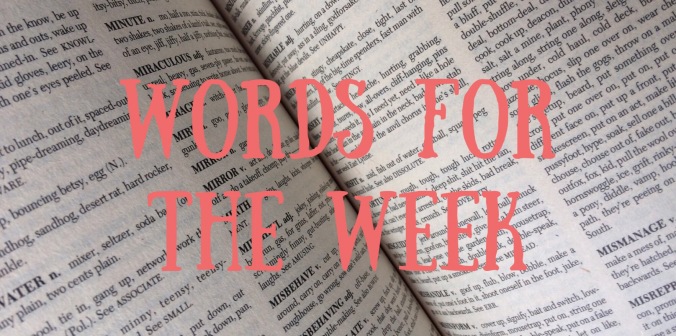
Hello again, folks! Welcome to another episode of Words for the Week, which happens every Sunday. I have so many books full of great words, and I so rarely have an excuse to delve into them. So I’m putting together a small selection of these lovely words once a week, in the hope that you enjoy them as much as I do. This week’s words begin with ‘M’.
Majuscule (noun): 1. A large letter used as the first letter of the word in writing or printing proper names; a capital letter; an upper-case letter; 2. Large lettering. (Adjective) Of or written in large lettering.
I quite like that this is a bizarrely vague word. Does it mean letters which are big? Capitals? Yes. Both of those. So while it could refer to that fancy big letter at the beginning of illustrated manuscript pages, it could also refer to the capital at the beginning of the sentence. It bridges the gap between the extraordinary and the mundane, somehow.
Materteral (adjective): Like or of an aunt.
Firstly, it sounds like you’re stumbling over the word ‘turtle’. Secondly, I’m interested in the fact that it’s so close to ‘maternal’. I mean, they’re literally sister-words, I guess.
Murmuration (noun): 1. A low, continuous, indistinct sound; the act of murmuring; 2. A flock of starlings.
Christopher is quite dismissive of this word in his description – it’s not a ‘proper’ collective noun, apparently. Get your head out of your prescriptivist arse, Christopher. It’s cute. This is probably less obscure than most of the words on these lists, but I wanted to include it because it’s great.
Maggle (verb): Gloucestershire, Oxfordshire, Worcestershire. To worry, tease; tire out, exhaust, expecially if one is hot and tired. Origin unclear, there may be a link with mangle.
I feel like I’m cheating slightly today – I should be feeling maggled because I’m outside and it’s boiling, or because I’m in the house trying to clear stuff out and it’s boiling. Instead, I’m in the local (air-conditioned) Costa with a fruit cooler, and if anything slightly chilly.
Mulligrubs (noun): Berkshire, Cheshire, Devon, Essex, Hampshire, Lincolnshire, Norfolk, Nottinghamshire, Oxfordshire, Scotland, Shropshire, Somerset, Suffolk, Sussex, Warwickshire, Wiltshire, Yorkshire. A stomach-ache, the colic; any imaginary ailment. Recorded in an extraordinary variety of forms: molligrubs, molligrumphs, moolygrubs, murdigrups and more. If you were ‘in the mulligrubs’, you could be low-spirited and sulky. It could also refer to an ill-natured person. The word may come from a kind of grub that lives in the mull – ‘mould’.
I mean, this is so wide-spread that I’m surprised it’s even included in a book about disappearing local dialect words. Why hasn’t this one been recognised in standard English? Oh, hang on. It’s going to be a class thing, isn’t it.
This week’s words were sourced from Foyle’s Philavery, collected by Christopher Foyle; The Disappearing Dictionary by David Crystal.
I love the word “murmuration”! I actually read it a lot when I was studying and working in environmental science.
LikeLike
SUCH a good word! Seems unfair that it can only be used for starlings though – surely it must occur as a phenomenon with other birds? Maybe not…
LikeLike
There are other words for other birds. I am such a fan of collective nouns! If you look at examples, you can see that the collective noun describes some type of behaviour or event that is associated with the animal. There are some nouns that you can use for numerous animals and others are very specific. You’ve given me an idea for a blog post!
Examples:
A murder of crows is pretty intriguing (or a horde). You can also say a murder of magpies.
An unkindness of ravens.
A raft of ducks, when on water, similar to a raft of otters.
A scold of jays.
A lamentation of swans.
A wake of vultures.
A charm of finches.
I had to look for these because I’m more in the know with mammals but I love them! These are the ones that stood out to me.
LikeLike
Oh my gosh PLEASE do a blog post on collective nouns – I love these! Lamentation of swans is GORGEOUS. And I do love a good murder 🙂
LikeLike
I’ve thought of doing a series now. I am so into collective nouns. Like seriously, this is what I used to nerd over when I was younger!
Thanks for bringing my love for collective nouns back!
LikeLiked by 1 person
Yay! 😊 You’re welcome!
LikeLiked by 1 person
Pingback: July Wrap Up – Huntress of Diverse Books
Pingback: Sunshine Blogger Award – Huntress of Diverse Books